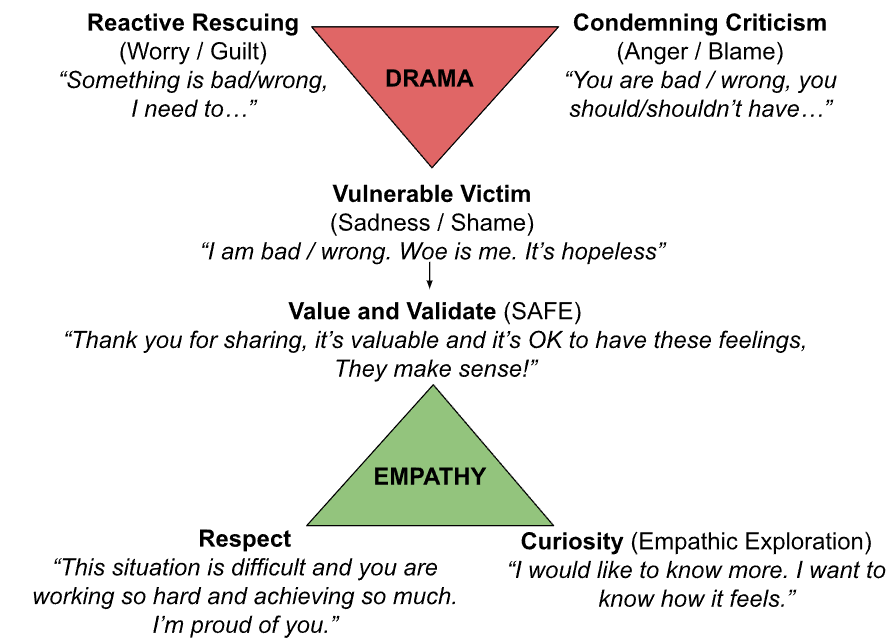|
When people feel vulnerable the psyche creates a protector using our powerful EMOTIONS. Sometimes this gets out of hand and it becomes a sabotaging ‘panicked protector’ which inhibits rational thinking to prioritize the immediate safety and survival of the organism. In order for the panicked protector to calm down and allow a rational discussion, it must first feel a sense of safety. This is achieved by giving the vulnerable person space to share and be appreciated and acknowledged, feelings to be validated, respected and recognised before problem-solving or reconnection can happen. I do this when dealing with any vulnerable moment in a relationship that I care for. It helps us feel heard, understood and loved. Then we can calm down and communicate openly and honestly. This can also be done SOLO as part of a therapeutic technique called Voice Dialogues (talking to yourself). See the bottom of this sheet for more information. Make it a habit to change your self-talk and your communication with others using SAFER communication: S: Space: Make space to slow down your speech and breath and listen fully to the other (or to yourself). Sharing openly won’t happen without making space for it. Practice mindful listening (80% of attention on them, 20% on your body and breath), no interruption). Fully allow space for anything that arises, whether it is emotional, challenging, repetitive, loud or quiet. For solo work, I give myself about 3 minutes to be heard. Key phrases here:
F: Feelings: Respect the feelings. Focus on and validate whatever someone is feeling. Get into the feeling tone a little, with them Reflect the vibe of the emotion in your acknowledgements. If you are not sure what they are feeling try and guess. Connecting to yourself can help with this. What do you feel?
When you share, try and connect with how you feel. Slow down as much as you can. You can always ask them if they could acknowledge what you said and felt. After you have both shared you can begin a normal dialogue to problem solve or connect physically to create a loving connection. DRAMA and EMPATHY triangles Below is my interpretation of the drama triangle and how it leads into the empathy triangle. The goal is to give empathy to the parts that are alive. When we do this they naturally come down the triangle, through vulnerability, like sand through an hour glass, and we value, respect and celebrate the person, leaving them feeling seen, appreciated and settled. To read more about my Drama/Empathy Triangles click here. Using this tool SOLO
Working with yourself or another it may be you have to move between parts a few times to reach a point where the vulnerable/emotional part feels calmer and safe enough to have a more rational and solution-focused conversation. Using a mirror can help, as a focus. Try and finish with positive reassurance for yourself - connecting with the parts that are loving, wise and calm. Morning and Evening Practice: Self-Parenting Mirror Work This is a practice I do daily, sometimes twice a day. The aim of all this work is to develop unconditional love which will allow a natural outpouring of gratitude, blessings, generosity, kindness, curiosity, playfulness, motivation, optimism and effective and creative work. To get there we have to be with what is real, in it’s rawest form, first, then bring in the wise, loving part of ourselves to dialogue empathetically. This requires ‘space’. Logistics You’ll need:
Solo Method:
© Neil Morbey: Positively-Mindful 2022
1 Comment
|
AuthorsNeil Morbey is a meditation teacher, group facilitator and inspiration guide for Positively-Mindful.com Blog Index
Archives
May 2024
|

 RSS Feed
RSS Feed